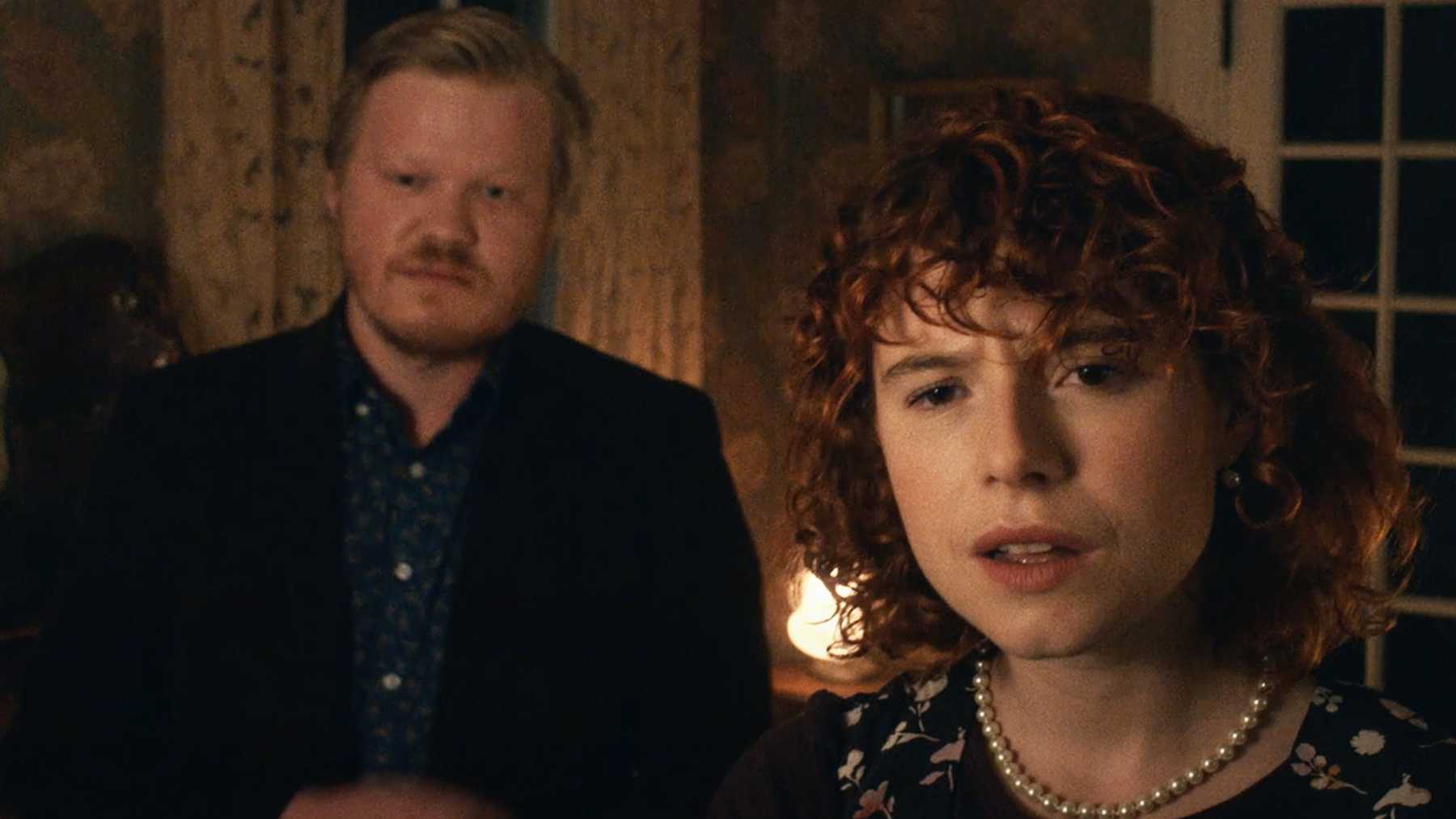From his screenplays for Being John Malkovich and Eternal Sunshine of the Spotless Mind, to his directorial efforts Synecdoche, New York and Anomalisa, audiences have come to understand that turning on a Charlie Kaufman movies means—for better or worse—discovering something they’ve never seen before. His work is so intrinsically tied to a sense of originality that a 2010 book on his career was titled Confessions of an Original Mind. So for many Kaufman fans, myself included, it was surprising to hear that his latest film would be an adaptation of a novel, Ian Reid’s 2016 debut I’m Thinking of Ending Things.
While it’s true that the story originated in Reid’s mind, and its premise—a woman has dinner with her boyfriend’s family for the first time—is deceptively simple, this film keeps the audience on their toes as much as any Kaufman project. It’s mostly a two-hander between our protagonist, a young woman (Jessie Buckley), and her boyfriend of about six weeks, Jake (Jesse Plemons). They drive toward Jake’s childhood home, a rural farmhouse, as snow pelts the windscreen. The couple’s conversation is fast and intellectual, thick with references to and quotations of famous poets or authors or philosophers. Their patter is interrupted by the woman’s inner monologue, wistfully narrated by Buckley, as she wonders whether or not she should break things off with Jake. Right off the bat, Kaufman’s screenplay is dialogue-heavy, as if he’s challenging the viewer to keep up with him as he laces the dialogue with clues that will become important later.
The funniest, most entertaining portion of the journey is when they reach Jake’s parents’ house, and a quartet of world-class actors—Buckley, Plemons, Toni Collette, and David Thewlis—have the opportunity to bounce off each other around the dinner table. Colette and Thewlis give hilariously strange performances as Jake’s parents, which stand in contrast to Buckley’s and Plemons’ more subdued turns. Thewlis, in particular, is a comedic delight as an aging man whose body twitches and twists like it’s made of rubber, and who enjoys an alternative sense of humor (“Let’s eat, or the food will be as cold as a witch’s tit in a brass brassiere”). These group scenes are equal parts humorous and eerie, as the impeccable timing of the performers and the edit creates silences that are more than just awkward—they hint at sinister things left unsaid between the family.
There’s something off in I’m Thinking of Ending Things; a viscerally upsetting undercurrent that courses through the entire film. Kaufman disrupts our sense of continuity by constantly changing tiny details about his characters: one moment Buckley’s character is called Lucy, then Louisa, then Lucia; she’s a poet, then she’s a painter, then she’s a physicist. And visually, Plemons and Buckley’s outfits change several times throughout in a way that’s barely perceptible. These are subtle clues that the film exists in a psychological rather than literal space, so nothing we see or hear can be trusted. One of the true stars of the production is cinematographer Lukasz Zal (Cold War, Ida), who makes a car ride through a snowstorm feel like a hellish journey into the darkest recesses of the mind by surrounding the vehicle with a deep pit of blackness within the boxed-in 1.33:1 frame.
I’m Thinking of Ending Things is a puzzle box of a movie, one I’m still desperately trying to prise open, but one of its many layers is a metatextual comment on the concept of “originality” itself. The film is a curious case: an utterly original work made up almost entirely of unoriginal elements. Kaufman keeps a lot of Reid’s stream of consciousness dialogue (or inner monologue) intact, and almost all of Kaufman’s additional dialogue is about other works of art: a poem by Eva H.D., a review by Pauline Kael, references to David Foster Wallace, Robert Zemeckis, Billy Crystal, Tolstoy, and Oklahoma! Kaufman even plays with different genres, from horror to rom-com to ballet to musical theatre to animation—it’s a joy to watch and a complete mindfuck. It feels like Kaufman is unspooling his personal anxieties about the pressure to be original when so much of what an artist creates is just a collage of different influences.
Cinephiles will undoubtedly spend the rest of the year and beyond trying to decipher what I’m Thinking of Ending Things means—and I’m wary that Kaufman is trying to say so many things that, when it comes down to it, he doesn’t have a precise ‘meaning’ at all. But it does have an atmosphere—of dread and fear—as present and palpable as any other film this year, and one that presciently matches the mood of 2020 in general. Like so much of Kaufman’s work, it’s a movie about characters who can’t stop thinking about death, and he teases out that existential dread as well as any horror filmmaker. Both times I’ve watched I’m Thinking of Ending Things, it’s left me feeling off-kilter, its last images lingering in my mind and the haunting final notes of Jay Wadley’s score ringing in my ears. This one will polarize viewers, but nobody can call it forgettable.
I’m Thinking of Ending Things arrives on Netflix on September 4.

